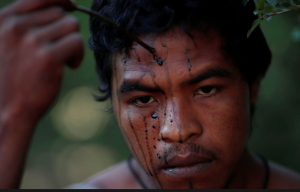More and more of the Amazonian rainforest has been cut, logged and replaced with pastoral lands. Although we know much about the way Bolsonaro has sold off large chunks of the Amazon purposefully instead of protecting the area. The Araribóia indigenous reserve is home to 5,300 indigenous Brazilians of the Guajajara tribe and the Awá and covers an area of 1,595 sq miles in the heartland of the Amazon. While many of the lands surrounding the area have been cut down, the tribal lands have remained relatively intact directly due to the efforts of the indigenous “forest guardians” who ward off logging gangs.

These articles are about the death of one of those guardians, Paulo Paulino Guajajara, at the hands of illegal loggers. Within Bolsonaro’s rule, attacks and invasions of indigenous lands have skyrocketed, with 160 reported cases of land invasions, doubling last year’s numbers. This is in tandem with his government actively dropping support of indigenous and environmental support groups by cutting their budgets and thereby cutting off any possibility for support from agencies meant to maintain the reserve. Effectively, leaving them to fend for themselves against the extreme violence used by the loggers and the brush fires that have plagued the region. Showing how Bolsonaro has essentially targeted indigenous people and their lands to be logged and specifically withheld support to sustain that aim.

Both of the articles specifically critique Bolsonaro’s government and his lack of support of indigenous people but through entirely different means. While Amazon Watch critiques the government through the use of the leaders of agencies within the government calling out it’s actions, the Guardian article subtly solely uses the indigenous people as their sources. This is significant because the Guardian use it to articulate the support of Bolsonaro through the entirety of government, along with the concept that these killings are regular occurrences that started as far back as 2015. Linking the idea to a sustained campaign rather than linking it specifically to Bolsonaro’s government. While the Amazon Watch article does it through the perspective of those in governance and the indigenous tribe, resulting in a seemingly coherent response against the atrocities from significant portions of the government. This therefore links the idea specifically to Bolsonaro rather than any other part of the government and placing the blame solely on him.
Many of the themes prevalent in our article link back to those we have studied within the classroom. Particularly authoritarian governments and their consistent conflict over indigenous rights. European colonialism has left a legacy of racial based class dynamic, with indigenous people being the poorest and most exploitable because of the wealth extracted from them from European elites, which has meant that a key way indigenous rights have been maintained and grown is through conflict. As we saw with Tupac Amaru and his failed rebellion, the Mexican revolution or even the Cuban revolution, much of the understanding of the role of racial hierarchy and colonialism in the perpetuation of that abuse was created under the fermentation of revolt against European style elites. The quote that “Large numbers of Afro-Cuban professionals…attest to the ways revolutionary actions brought about change”(Benson, 24), supports the idea that conscious understanding of indigenous rights and rights for people of colour is brought about through newfound awareness during periods of violence.
Work Cited:
Benson, Devyn Spence. “Not Blacks, but Citizens.” Antiracism in Cuba, 2016, 30–71.
Cowie, Sam. “Brazilian ‘Forest Guardian’ Killed by Illegal Loggers in Ambush.” The Guardian, November 2, 2019.
Rossi, Camila. “Indigenous Forest Guardian Murdered by Illegal Loggers in Brazilian Amazon.” Amazon Watch, November 1, 2019.
Parracho, Lunae. Ka’apor Indian Warriors Tie up Loggers during an Expedition to Search for and Expel Illegal Loggers, November 1, 2019. Photograph. Reuters.
